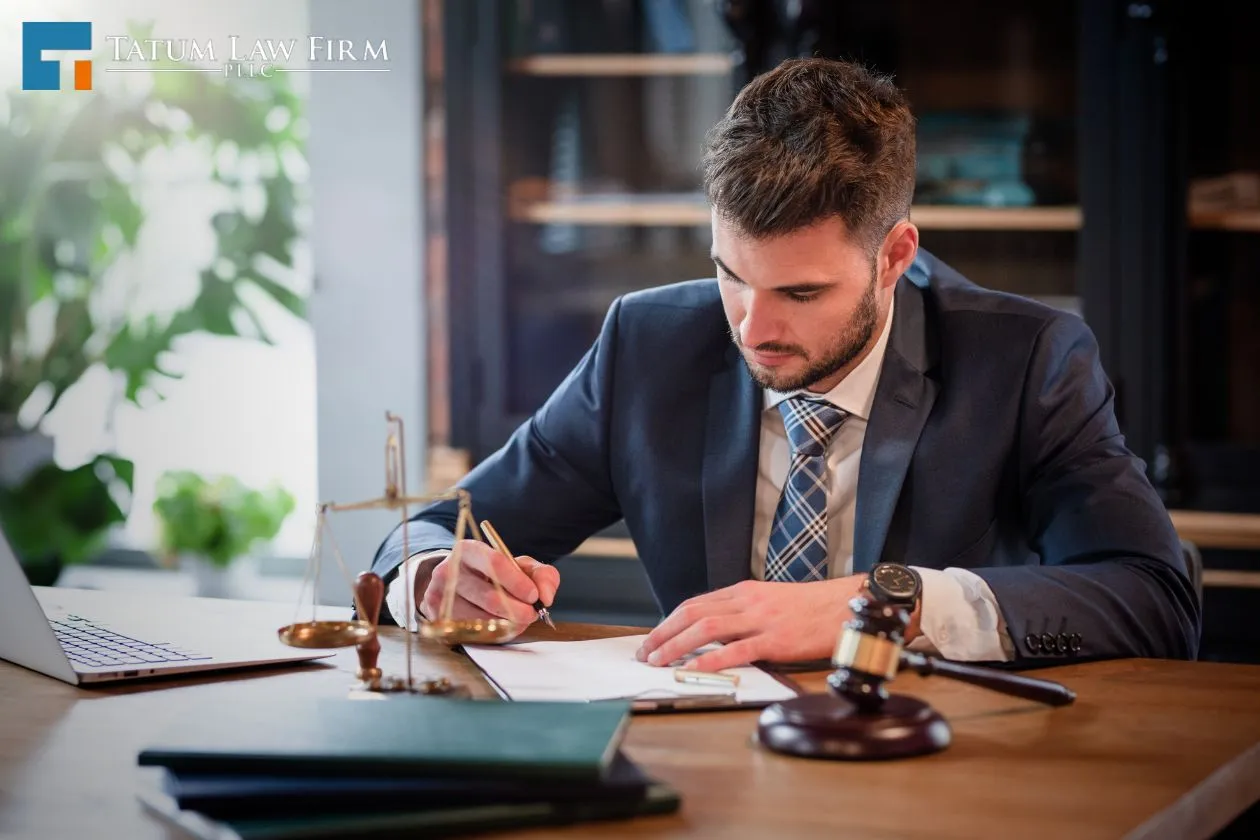Alabama Legal Malpractice Lawyer

Alabama Legal Malpractice Attorney
As a client, you place a lot of confidence in your lawyer, and you expect that your case will be handled with great care and professionalism. It’s frustrating when a lawyer does not do what is expected of them, especially when their negligence causes you harm. Your entire case can be ruined because of a lawyer’s careless mistakes and lack of professionalism. Fortunately, clients who suffer damages because of malpractice can receive compensation with the help of an Alabama legal malpractice lawyer.
It is important to speak with an attorney if you have concerns that you have been a victim of legal malpractice. The Tatum Law Firm, PLLC, is an experienced law firm that can review your case and inform you of your options.
Why You Should Choose Tatum Law Firm, PLLC
At the Tatum Law Firm, PLLC, we represent all our clients with confidence. We have over 20 years of experience with complex cases, and it is our goal to get all our clients the compensation they deserve for their damages. We provide effective legal counsel and work diligently to get the desired results for every case we handle. We can go over the details pertaining to your case and listen to your concerns to ensure we are providing the most effective representation.
Understanding Legal Malpractice in Alabama
In the state of Alabama, legal malpractice is defined as circumstances where your lawyer does not do their job correctly or adequately, thereby possibly harming you and your case. Legal malpractice, like medical malpractice, implies that there was some form of negligence on the part of the professional. There are several ways a lawyer can be negligent, including:
- Breach of confidentiality. A lawyer is not allowed to share any confidential information about their client unless that client expressly gives permission. If there is specific information a client asks their lawyer not to disclose to anyone else, the lawyer cannot share that information unless it is information that falls into a legal exception.
- Conflict of interest. When a lawyer represents two clients who are on opposing sides of the same case and neither of them is aware, or the representation of both parties affects the lawyer’s relationship with one or both, this is a conflict of interest. A lawyer also creates a conflict of interest when they cannot give a client the attention they need because of their responsibilities to another person or personal responsibilities.
- Committing Fraud. A lawyer who deceives their client or purposely gives them false information that leads to the client being harmed in some way is committing fraud. Lawyers have a duty of care, to be honest with their clients during and after the legal process.
- Failing to meet deadlines. A common example of a negligent lawyer is one who fails to file appropriate paperwork or accomplish other tasks before the deadline. Failing to file a claim can cause a client to lose the right to file at all if the deadline is missed.
- Charging excessive fees. It is not unheard of for a lawyer to charge a client more than the agreed-upon fees. This may not hurt your case, per se, but it can still be a financial burden, and it is still considered malpractice because of a lack of integrity and honesty when representing a client.
- Breach of fiduciary duties. Lawyers have an obligation to always act in the interests of their clients. A breach of fiduciary duty happens when a lawyer does not act in the interests of his client but instead acts in their own interests or the interests of someone else.
A Lawyer’s Duty of Care
All lawyers are required to abide by the rules that have been laid out by the American Bar Association- the Model Rules of Professional Conduct. These rules establish a certain duty of care for lawyers when working on client cases, as well as a basis for legal malpractice. According to the Model Rules of Professional Conduct, Lawyers must:
- Competently provide clients with representation. They must be knowledgeable and have the experience to effectively handle their clients’ cases.
- Have open communication with clients for the duration of the representation. In some cases, it can be years before cases are resolved. Even if there is nothing substantial to tell a client, a lawyer must still let them know where they are in the process or what is causing a potential delay.
- Avoid any potential conflicts of interest, and let the client know as soon as possible if there are any. A lawyer cannot represent two people on opposing sides of the same case without informing both clients.
- Uphold client confidentiality while and after representing the client. Unless the client waives this privilege, the lawyer has a duty to ensure client confidentiality. There are, however, circumstances that allow this confidentiality to be broken, so be aware of those restrictions.
- Act with integrity, honesty, and the expected level of professionalism when dealing with the court, other lawyers, and any others involved in the process.
What Damages Am I Entitled to in a Legal Malpractice Case?
Winning a legal malpractice case means you might be able to recover certain damages because of the harm you suffered as a result of your former lawyer’s negligent behavior. Clients often receive compensatory damages, punitive damages, and equitable relief when their cases are successful.
- Compensatory damages. You can be compensated for the financial loss you suffered because of the malpractice. This could include loss of income, legal fees you paid another lawyer to fix your former lawyer’s mistake, or the compensation you would have gotten had your lawyer not been negligent in handling your case.
- Punitive damages. If your former lawyer’s behavior was especially poor, you could be awarded punitive damages. This is typically meant to punish a defendant to prevent them from engaging in negligence again and serve as an example to keep others from doing the same.
- Equitable relief. It is possible to receive equitable relief if there is a breach of contract. This would be an order that requires your former attorney to do something or refrain from doing something. In the case of legal malpractice, the order can require the lawyer to pay back any fees that were paid to them or correct the mistake that resulted in the damages.
Alabama law can be complex in terms of legal malpractice. The damages you are entitled to are specific to your case circumstances. Unfortunately, attempting a malpractice case on your own will be difficult. It is advisable to consult with a lawyer who is familiar with the malpractice laws in Alabama to determine your rights and your options.
How Do I Prove Legal Malpractice?
Lawyers can make mistakes, but that does not mean every mistake is considered malpractice by law. In Alabama, you must prove certain conditions were met to hold an attorney accountable for malpractice. You will need to prove:
- The lawyer had a professional duty to represent you and provide legal services for an agreed-upon fee.
- The lawyer somehow breached that duty.
- You suffered some form of harm or damage.
- The harm or damages suffered were directly caused by the lawyer’s breach of duty.
Be advised that losing a case does not mean your lawyer did anything wrong, but that it is not enough to constitute malpractice. It is extremely difficult to prove that your lawyer’s negligence is what caused you to suffer a loss. To do this, you have to show that if it were not for your lawyer’s actions, your case is likely to have had a different outcome that was in your favor.
Alabama Legal Malpractice FAQs
Q. What Constitutes Legal Malpractice in Alabama?
A. Legal malpractice in Alabama is classified as a lawyer’s failure to provide their client with effective and professional representation, thereby causing the client some form of harm or damages. If a lawyer fails to meet certain deadlines, withholds important information from their client, or misuses funds entrusted to them, they can be held liable for malpractice.
Q. How Many Years Do You Have to File a Malpractice Claim?
A. You have exactly two years after the malpractice occurred to file a malpractice lawsuit in Alabama. This is the statute of limitations. It is possible for a six-month extension to be provided if there was no reasonable way for you to discover the malpractice in that two-year timeline. You should contact an attorney who is familiar with legal malpractice cases to get more information.
Q. What Is the Statute of Repose for Malpractice in Alabama?
A. The statute of repose for malpractice in Alabama is four years. This means that no matter when you discovered the harm due to your lawyer’s malpractice, you will not be allowed to file a claim if four years have passed since it occurred. There are no exceptions to this deadline.
Q. Can You Sue for Legal Malpractice in Alabama?
A. Yes, you have the legal right to sue attorneys for legal malpractice in Alabama. However, it may not be easy. The most difficult part of proving attorneys committed malpractice is showing that their actions directly caused you harm. You will have to show that the outcome of your case would have been different if not for the negligent actions of the lawyer representing you.
Contact an Alabama Legal Malpractice Attorney Today
All lawyers have a certain responsibility to their clients, and when a lawyer is negligent or unprofessional, it can cause problems for their client’s case. At the Tatum Law Firm, PLLC, we take legal malpractice very seriously.
We can help you ensure that your former lawyer is held accountable for failing to act with the professionalism expected of them. If you believe you have a legal malpractice case, contact our firm today so we can examine your evidence and explain your options.






